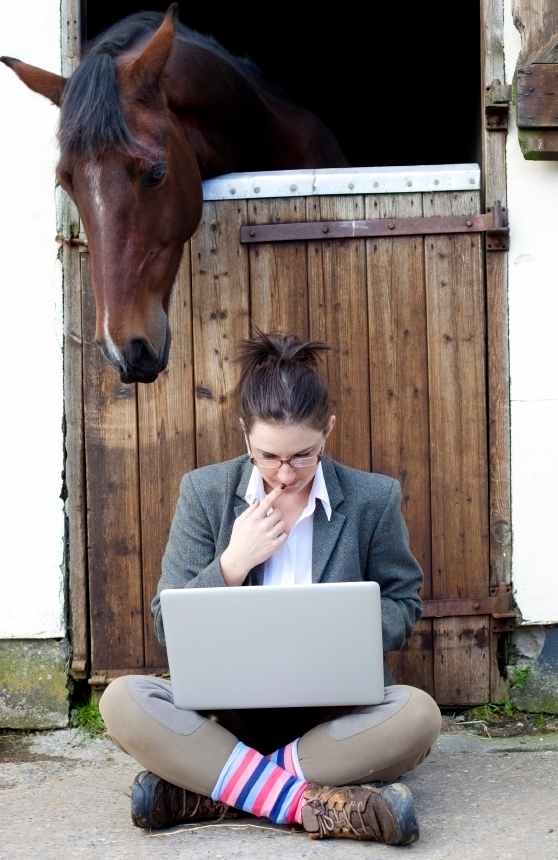Probably every horse owner spends time during tax season looking at their horse expenses and wondering whether any can be turned into tax deductions.
Accordingly, I thought, given the time of year, that I’d ask a tax CPA about all this. What follows is my interview—an interview that happens to be with my father, the managing member of local CPA firm in Redmond, WA.
Are Horse Expenses Ever Deductible on a Tax Return?
Yes, they may be—and in a couple of circumstances.
First, if your equestrian activities constitute a business, you can deduct any of your ordinary and necessary horse expenses as business expenses. If you’re a horse trainer and you own and use a horse to provide lessons, for example, you can probably depreciate that horse and deduct all of your horse-related expenses as business deductions.
Second, if your equestrian activities don’t constitute a business but rather amount to a hobby, you may be able to deduct any hobby expenses to the extent you have hobby income.
For example, if you earn $1,000 from training or in some contest or for boarding a friend’s horse, you may be able to deduct up to a $1,000 of horse expenses as hobby expenses.
Unfortunately, deducting hobby expenses is tricky. Hobby expenses are deductible only if you itemize your deductions (and most people don’t) and only to the extent your hobby expenses and other miscellaneous itemized deductions exceed two percent of your adjusted gross income.
Furthermore, I should say you need to handle hobby deductions in specific way. You first need to deduct mortgage interest, property taxes and casualty losses. Then second you deduct any other operating expenses such as feed and veterinary care. And last of all, you would deduct depreciation on things like fencing, stables or an arena.
Can Someone Self-Prepare a Return with Horse Income and Deductions?
Sure, I think so. Most people should be able to use a product like TurboTax or TaxCut to do their return. And there’s little reason not to try this approach first.
To self-prepare a return, you just need to take your time and carefully follow the software’s instructions. By the way, I would strongly recommend using a tax software program. Don’t try to do this by hand.
And one final general observation about equestrian taxpayer tax returns: Do-it-yourself tax preparation should present little problem if your finances are fairly simple and you’re pretty organized.
How Does a Horse Hobby Become a Horse Business?
Because business losses are so easy to deduct and can shelter other income (including wages you or a spouse earns), the Internal Revenue Service is suspicious of any business that includes elements of personal pleasure, leisure or recreation.
Given this reality, anything having to do with horses is suspect.
Basically what you want to look at if you’re trying to decide whether your horse activities constitute a business or a hobby is the way you conduct the activity.
You want to consider, for example, the time, effort and expertise you or your advisors deploy. You also want to be able to convincingly argue that you pursue the activity in order to make money either in the short or long run.
Two examples probably highlight the extremes on the continuum here.
You can’t run up $10,000 of horse-related expenses for your 11-year-old daughter and convincing argue that you or your daughter horse ownership has a profit motive. Your daughter probably only spends a small portion of her time and effort on the “business” of having a horse. Her expertise—even if substantial for a pre-teen—is quite honestly limited.
However, an experienced trainer who spends 30-40 hours a week caring for horses and giving lessons? Who conducts this operation in a business-like manner? Who honestly hopes to make a profit at some point? Making a case that this activity is a business should be easy.
One other thing to note: The IRS presumes that any horse-related activity which produces a profit in at least two years in a consecutive seven-year period is a business and not a hobby.
Any Other Tax Tips You Can Provide Horse Owners?
Yes. I always recommend any taxpayer or business owner keep clean, organized accounting records. That’ll minimize the chances you’ll lose deductions or miss write-offs. Furthermore, good accounting records would tend to reflect that an activity is being conducted in pursuit of profits.
Finally, if you are taking position that your horse activities are a business, be consistently business-like: Have a business plan. Have a business license if required. Consider using a real accounting system like QuickBooks. Oh and one other thing. Do document the stuff you do to improve the profitability of your operation.


I love the content of your site <3. I will come back more often on your blog for sure.